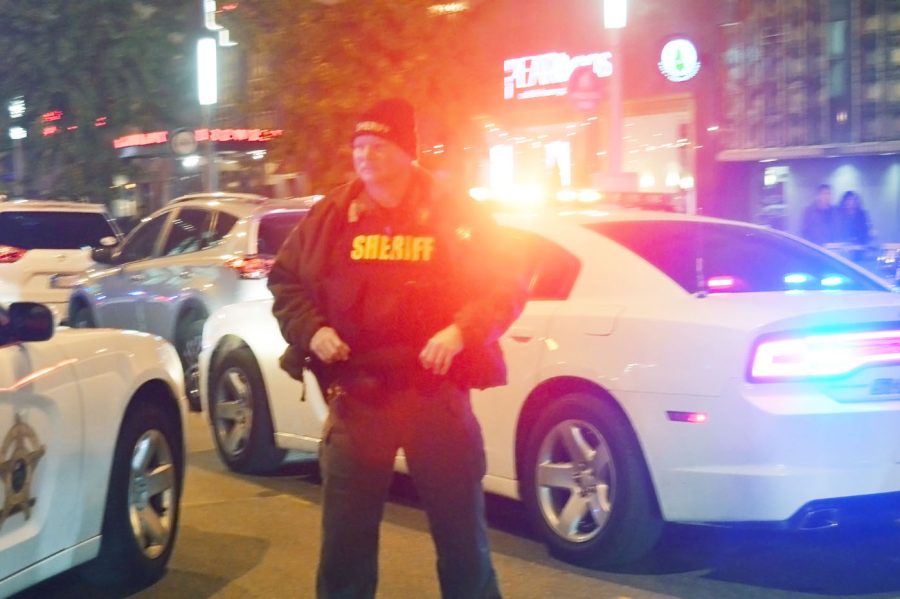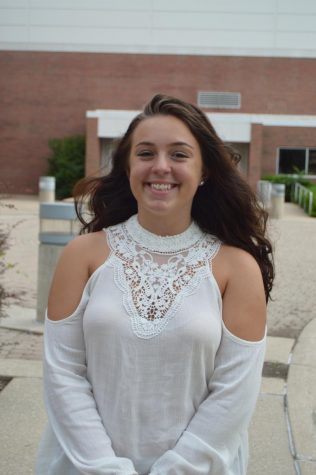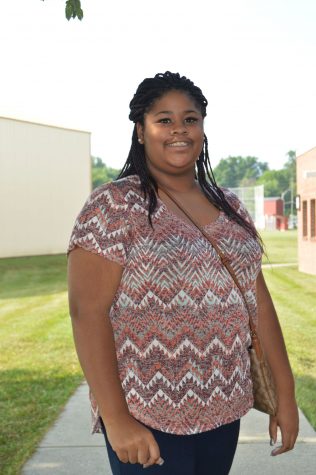Do teens respect cops?
Recent events and personal experiences influence view of police.
A police officer watches over a protest against President-Elect Donald Trump and Vice President-Elect Mike Pence downtown Indianapolis on Nov. 12. No violence arose during the night.
November 17, 2016
The air was cool against senior Micah Walker’s face as he stuck his head out the sunroof window of senior Heather Blankenbaker’s car, attempting to capture the perfect shot of the setting sun. Accompanying them was fellow photographer senior Mikayla Whittemore. It wasn’t until Walker noticed the police car trailing behind them, that he grew nervous.
“I’m 100 percent sure it was a racial thing,” Blankenbaker said.
Whether students at SHS have seen situations with police in videos or interact with them at home, many students have contrasting views of police.
For some, like Walker, Blankenbaker and Whittemore, it’s more personal than videos or stories. It was a reality.
The students were eventually pulled over and more police arrived. The officers checked for IDs and searched for weapons in the car. The officers then said that they had received a report that the students were targeting police officers, but according to Walker, it appeared that they had not seen anyone outside of the houses until they had seen the police car behind them. When the students objected and tried to prove their innocence with the pictures of the sunset they took, they were accused of deleting any other pictures.
“I think they were trying to egg us on because they wanted a reaction,” Blankenbaker said.
According to all three, Blankenbaker, Walker, and Whittemore, there was a second officer who was very disrespectful and abrupt. Whittemore says that he was very snappy and had a nasty attitude compared to the other older officer.
“We were being cooperative and answering their questions,” Blankenbaker said. “I was being nice. I was trying to keep it under control.”
According to Walker, while they were stopped and the officers were questioning them, a topless Jeep “packed with white kids” zoomed past, blantly going over the speed limit. The officers did not react and kept interrogating the students. Blankenbaker says she is sure it was because of their race and the fact that they were in a white neighborhood.
They were eventually let go without a ticket, and no harm was done. However, Blankenbaker says this experience will forever have an impact on how she views police officers.
“Now when I’m around (police), I get a little more nervous,” Blankenbaker said.
Walker says he has always felt the same towards police officers, even before his personal experience with them.
“I understand that (police officers) have a job to do,” Walker said. “But to some extent, some things are just over-excessive.”
Some encounters with police, however, do not end as peacefully as it had for the three students.
In the last decade alone, the total number of people killed by police in the US is over 5,000, surpassing the number of American soldiers killed in the Iraq war, according to www.globalresearch.ca.
Police brutality has led to many deaths, including police officers and victims who were later proven innocent. It has started deadly riots, angry mobs and heartbroken families. According to www.mappingpoliceviolence.org, it has been an issue for all races, but primarily the black community, with black people being three times more likely to be shot by police than white people.
Police brutality has also proven an issue for SHS Sophomore Esther Van Lal Malsawm Sangi, who is not directly affected by it, but influenced by their actions. She says she had always dreamed of being a police officer, until she learned how cruel they could be to minorities from viewing a video uploaded on Youtube. The context of the video contained a black male being shot by a police officer, illuminating the violence by police towards minorities in America.
¨It was really scary,” Van Lal Malsawm Sangi said. “People are hating on the police.., I don’t want to have those kinds of (problems involving discrimination).¨
She says that although this influenced her withdrawal of support, she wishes for others to become educated about the situation.
¨Sometimes it’s not fair when you don´t know the whole story,” Van Lal Malsawm Sangi said.
Some students have a more personal connection with police officers, and view them more intimately. Sophomore Layne DeHart’s father, Mike DeHart, has been an officer for 25 years and counting. Layne explains that just because there have been awful things done by some police officers, they don’t define all other ones.
Though people may not make the best decisions, their decisions do not define others but can affect other individuals. However, not everyone sees the cop’s view on it and act out against them. Because of this, he is constantly worried about his father’s safety.
“It’s nerve-racking because you don’t know if he’s going to come home everyday,” Layne said.
SHS students’ mindsets vary throughout the school based on their personal experience with the police, some having a similar experience as Walker, Blankenbaker and Whittemore had, and some will change their occupation for the fear of civilians hating them for doing their job, like Van Lal Malsawm Sangi. But they all have one thing in common; they believe that the conflict between police and civilians has become a problem and needs to be addressed.




